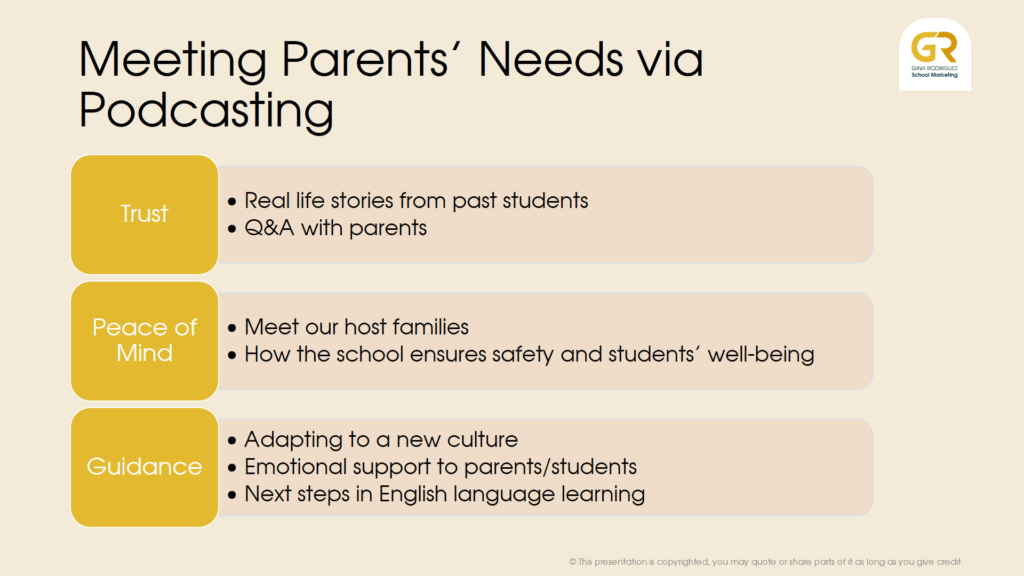Education and Technology Trends Impacting ELT in 2024
“Education Trends and Digital Trends almost always have an impact on the English Language Teaching (ELT) industry at a certain point. For this reason, checking what is trending in education and in technology will allow language schools to plan in which direction they should move in ELT and ELT marketing to be ahead of the game.” Extract from Digital and Education Trend that will impact ELT in 2023.
I thought I’d repeat this statement to begin this blog article because it’s not only what I firmly believe but also the main reason why I devote time every year to write about trends in education and technology. Personally, as an ELT Marketing Consultant it is crucial to keep abreast of trends.

Hi! I’m Gina Rodriguez and the founder of GR School Marketing. I support language schools in building an engaging social media presence through training and tailored marketing strategies.
Vision: I believe that successful language schools are the ones that teach the language as a tool that empowers students . My services are designed to foster a culture of continuous improvement and innovation so that schools can thrive and every unique offer can be showcased effectively online.
Here’s a summary of the main points:
- Trends in Education and Technology impacting ELT in 2024 vs 2023
- Emerging trends impacting ELT in 2024
- 1. Artificial Intelligence: Language Models and GenAI
- 1. 1 The impact of GenAi on Language Schools as a business
- 2. The growth of EdTech Companies in the ELT sector
- What’s trending in education that matters to ELT?
- New trends in ELT for 2024:
- Resources to keep up with trends in language education and technology
- Ready to implement trends in ELT for your language school?
Trends in Education and Technology impacting ELT in 2024 vs 2023
In last year’s article I predicted that three main digital trends would gain more and more space in ELT before going mainstream in language schools: Virtual Reality, Artificial Intelligence for Large Language Models (ChatGPT) and the Metaverse
Then as 2023 unfolded we surprisingly saw Virtual Reality and the Metaverse hype fade away while (less surprisingly) we saw that Artificial Intelligence-powered tools like ChatGPT gained more and more attention. This meant that AI literally invaded every angle of the ELT arena. Clearly, as it may happen with trends, VR and the Metaverse lost appeal (but didn’t disappear) as they were overshadowed by AI for large language models like ChatGPT and several other AI-based tools.
This shift in the trends scenario confirmed the dynamic nature of trends. In other words, when we talk about trends we need to be fully aware that they may evolve and develop or simply fade away.
“A trend is a general direction of change that is developing and becoming more common. This means that it is not common yet but it will become as it continues to develop and to be adopted”
Emerging trends impacting ELT in 2024
While some trends have effectively become part of the curriculum like Green English Language teaching among others, the following are emerging and therefore have not been widely adopted yet.:
1. Artificial Intelligence: Language Models and GenAI
AI continued its upward trajectory during 2023, becoming a prevalent topic in webinars, conferences, and social media platforms. It’s evident that AI is here to stay, as emphasised by teacher trainer Cristina Cabal in her article “Creating Language Chatbots to Safely Share with Students“ :
“Artificial Intelligence- you can choose to embrace it or ignore it, but I assure you it is not going anywhere. It is here to stay, so I choose to love it and use it, to squeeze it and to have fun with it.”
Cristina Cabal
I agree with Cristina that we can’t get away from AI and embracing it is better than avoiding it at all, however, we must also bear in mind its risks and challenges.
We are literally living the fourth industrial revolution with changes in the physical, digital and biological worlds happening at a pace that is hard to keep up with. The impact on every aspect of life, including education and language education, is huge. For more “traditional” language schools, this means that today, more than ever before, the ability to adapt and to do it pretty fast is a question of surviving in a complex market.
AI is “THE trend” in technology that had the biggest impact on society and education last year and, obviously, it will continue to drive change, joys and disruption in 2024.
For this reason, language schools need to remain vigilant and informed to be able to make the most out of AI’s opportunities. Also, it is key for them to be prepared to deal with AI’s challenges to make the best informed decisions for the future.

From the “The Fourth Industrial Revolution” by the World Economic Forum research
1. 1 The impact of GenAi on Language Schools as a business
I believe that one of the best documents out there that deserves a proper read by decision makers in English language education is the British Council’s “Artificial Intelligence and English Language Teaching “ report.
It’s a seventy-six page document with data, key insights and reflections from a survey among almost 1,4k teachers from 118 different countries. It also includes interviews to some important global leaders from the ELT sector.
This report will help language school leaders get a good part of the picture which they will then need to contextualize within their local realities as part of their sales and marketing strategy .
After reading the British Council’s report I think there are three important points for language school leaders to consider when planning ahead:
- The AI based tools teachers are using
- What teachers are using AI for
- The need to develop AI literacy for teachers in language schools
1.2 The lack of AI literacy in training for EFL teachers
Most teachers who took part in the survey by the British Council declared, unsurprisingly, that they had received no AI training.
“Some educators have taken the initiative to self-educate, as noted in responses like ‘I am trying to learn as much as I can by myself’ and ‘I have completed online […] courses to develop my knowledge of AI in teaching’. A few indicated positive experiences, but the overarching theme is a call for more structured and comprehensive training opportunities.”
“This friction between expectations of ELT and the incoming use of AI may also be reflected in the attitudes of some learners or their parents.”
1.3 Artificial Intelligence and its Implications for Language Schools
Language schools that want to stay afloat as a business and stand out as an educational institution need to invest time and resources in integrating the latest AI technology in their strategy to enhance their language offer as well as make the way they operate more efficient.
This doesn’t have to be a huge investment; they can start small by:
- Enabling access to AI training to develop AI literacy for teachers
- Choosing technology with pedagogy in its heart
- Integrating AI-tools that make lessons truly dynamic, creative and engaging in a way that they generate word of mouth and that the school has a distinctive offer to market.
The simple introduction to some AI-based tools as explained in this live chat “Exploring AI-based tools for Smarter Lesson Prep” with AI expert Joe Dale can immediately bring innovation in the way you operate.
2. The growth of EdTech Companies in the ELT sector
According to Report LInker “Online education is expected to see substantial growth due to the increasing availability of digital technologies and the rising demand for flexible and accessible learning options”. This implies that Edtech companies have a huge potential and will continue to grow.
On the other hand, more and more teachers are becoming entreprenuers, or rather “teacherprenuers” launching their own teaching businesses.
“Teaching English online as a teacherpreneur is a big business, with continued projected growth as the EdTech industry continues to grow, creating increasing opportunities to teach and learn online” The Bridge
The impact of the increase of Edtech companies combined with the steady growth of teacherpreneurs (facilitated in part, by edtech solutions) means that brick and mortar language academies are likely to suffer a leakage of students.
This is likely to happen UNLESS schools adopt strategies to differentiate and help them drive student retention like:
- Focusing on the social side and experience of learning a foreign language which apps can’t deliver.
- Focusing on teaching English as a tool rather than a subject to differentiate from the average school
- Adding an online offer that uses the latest Edtech platforms and not limiting themselves only to the traditional face-to-face heads-down course experience. This option is perhaps the hardest because it implies a change within the business model. Also, it implies adapting quickly to the new trends in the market. ( Adaptability again!)
What’s trending in education that matters to ELT?
At the beginning of last year there was evidence from ELT publications, ELTons awards and main education conference topics that the following were strong trends:
- Soft skills for Employability
- Social Emotional Learning
- DEIB (diversity, equity, inclusion, and belonging )
- Financial Literacy.
We ended the year seeing those trends staying strong with financial literacy gaining grounds slowly in education but not much in the ELT classroom yet.
New trends in ELT for 2024:
1. Pronunciation for ELF
In the wake of more awareness and acceptance of ELF (English as a lingua franca) and the fact that learners need it to communicate in international contexts, there’s an emerging trend of fostering the pronunciation of English for intercultural contexts.

This trend is confirmed by the position paper “English Pronunciation for a Global World” by Oxford University Press and the recent book “Teaching English Pronunciation for a Global World” by Robing Walker and Gemma Archer, OUP. The aim is to “equip learners to be easily understood”
Is your language academy embracing this trend?
2. Podcasting
There has been plenty of research about how podcasting has had an impact on students’ learning (check academia.eu). Podcasting has been used also as a way to enhance course content in higher education.
While podcasting is trending in higher education it hasn’t taken off yet in English language learning. However, seeing the popularity of podcasts among EFL teachers, I believe that pretty soon we will see podcasts aimed at language learners.
Personally, I think podcasting is also a powerful marketing tool. Why? Because it can be easily integrated in the marketing strategy to establish a connection with students and parents.
For example, language schools working with international students can use podcasting to meet the parents’ needs before, during and after the student stay. Check these examples I shared at the English UK Marketing conference in London:

Here’s an exciting opportunity for language schools both in terms of supporting their students and their parents as well as from a language school marketing point of view.
3. Intercultural Skills
Fostering an effective intercultural communication has become crucial today due to the increase of hybrid international work environments ,student mobility and immigration. These are scenarios that enjoy a rich cultural diversity. For this reason, having intercultural communication skills have become key to ensure effective communication between people of different cultural backgrounds. This isn’t a brand new trend in education but it is gaining more traction in the English language teaching sector.
Have you considered innovating your company courses by adding intercultural skills?
Resources to keep up with trends in language education and technology
- Linkedin: follow Joe Dale for updates and AI news
- Telegram: follow Nik Peachey’s channel called “Nik’s Edtech & ELT Updates” for the latest industry news and AI-based tools releases
- The Nile: check their teacher training programmes for developing teachers’ competencies
- Journals: Modern English Teacher and the Pilgrims
- Reports: The Future of English, AI in English Language Teaching both by the British Council.
- Podcasting: Communicating for Impact is run by educator and podcaster Laura Wilkes. Find options to get started with podcasting.
Ready to implement trends in ELT for your language school?
In conclusion, strategy, adaptability, curiosity, and collaboration are paramount for leveraging trends to gain a competitive edge in the ELT market. Each language school is unique, requiring tailored approaches to capitalise on emerging opportunities. Embracing innovation and staying informed are key to navigating the dynamic landscape of language education and technology.
For a detailed analysis and assistance in integrating trends into your course offer and and marketing strategy, feel free to contact me. By applying the OODA (Observe, Orient, Decide, Apply) method, I am able to offer bespoke strategies aligned with your goals to help you stay sharp and competitive.
Reach out to Gina Rodriguez ELT Marketing Consultant for a no-obligation call by clicking here.

Support this blog on Ko-fi


